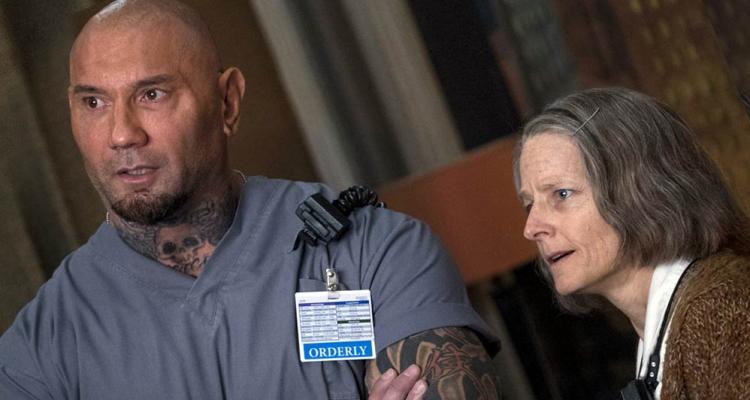Having earned the right to be selective and turned into a fine director in her own right, Jodie Foster hasn’t appeared in a film in five years because at this stage in her life; she doesn’t have to do anything she doesn’t damn well please. One then presumes something is compelling enough in writer/director Drew Pearce‘s “Hotel Artemis” screenplay to have coaxed the distinguished icon off her couch and back on the screen. And sure, there’s a fascinating premise here— in a dystopian future, a nurse runs a secret, members-only, emergency room for criminals—but beyond that, the value in the aimless “Hotel Artemis” to a discriminating star like Foster is as puzzling as a wealthy actor checking into a fleabag motel.
Though it shouldn’t be. There’s a John Carpenter-esque high concept, single-setting claustrophobia to the film’s foundations. However, much like its uninspired characters, the plot of “Hotel Artemis“ is purposeless, lurking through the hallways looking for a reason to exist. It’s a marginal crime noir and a frustratingly dull one that squanders its all-star cast and fails to capitalize on the action franchise boom of similar films like “John Wick.”
Set against the backdrop of the 2026 Los Angeles riots, an aged-up Jodie Foster is The Nurse of Hotel Artemis–a triage spot for career criminals. Along with Everest (David Bautista) the other RN on duty, the two run a tight ship with a few strict rules for all who enter: no guns, no violence, no cops, and be kind to the staff. Tension mounts when Waikiki (Sterling K. Brown) and Honolulu (Brian Tyree Henry from “Atlanta”) show up at the Hotel, after a botched bank robbery, the latter criminal so severely injured he’s put on life support to survive.
The story’s MacGuffin is a secret mobile vault with four canary diamonds that Honolulu stole from a stranger during the robbery. Problem is those diamonds belong to the Wolf King (Jeff Goldblum), the big bad of Los Angeles. Two other felons, Acapulco (Charlie Day) and Nice (Sofia Boutella) are also at the Hotel Artemis recovering from injuries; Nice on a mission to kill the Wolf King, and Acapulco there to be annoying (like the characters in every other film Charlie Day is in). However, when the lights at the hotel are suddenly cut, all rules go out the window, and everyone is on the back foot, ready to rip each other’s throats.
“Hotel Artemis” is moody and stylish in all the ways noir can be. The lived-in hotel set has a 1970s grunge to it, and the production design is ace. However, the film’s most exciting moments lie in the execution of the medical technology. It’s fascinating to watch a 3D printer create a liver, and 30-minutes later kill someone. But there’s not much more to luxuriate in. The movie’s one fight scene is undoubtedly memorable—Boutella takes down an entire group of henchmen by herself— unfortunately, however, that’s about all “Hotel” Artemis” has to offer regarding amenities.
The biggest issue with “Hotel Artemis,” and the reason you may want to speak to the manager about your dissatisfaction, is the movie’s stakes. It’s not that they’re not high enough, though that’s a problem too, it’s that the audience is never really aware what they are? Is it the diamonds? Is it the Wolf King? The movie never makes this clear and a lot of it feels like, “been there, done that,” especially with the “no-violence inside the club” rule that feels like it’s ripped right out of The Continental hotel in “John Wick.” Many other elements feel familiar, the playback technology used as Nice assassinates her target, feels lifted straight from Kathryn Bigelow‘s “Strange Days”; and the dystopian setting feels all too familiar.
In all fairness, Drew Pearce’s movie has some interesting texture to it, but it’s all lost in the convoluted execution. A small politically-charged subplot where the people of L.A. riot against corporate privatization of the city’s water supply fascinates. Foster’s agoraphobic Nurse character lost her son due to drugs and feelings of guilt and anxiety keep her confined to the hotel. Pearce teases these two brilliant ideas, but unfortunately, the concepts, which prove to be more interesting than the thin main plot, aren’t explored in detail and add nothing to the overall story arc.
It’s clear, given the open-ended conclusion, David Pearce hopes to turn “Hotel Artemis” into a franchise of some sort, but it’s a bit of a cart before the horse situation, and the stallion isn’t all that captivating as it is. Will Jodie Foster feel compelled to return after seeing the final product, something that’s far less deluxe than is on the page? Maybe there is potential for more from this universe in the future, but for now, this 3-star hotel is in need of a serious renovation and Foster should probably have a few words with the concierge. [C]

